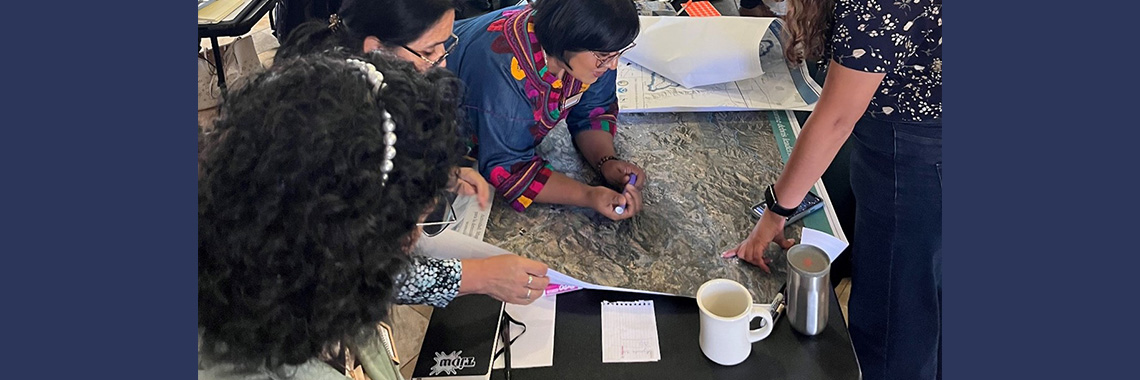
Brittney Ochira, Associate Director of Training Operations, National Conflict Resolution Center
As extreme weather events become increasingly common, there is a growing urgency surrounding disaster preparedness. From a natural resource management perspective, how natural communities are going to adapt, how resilient they will be, and what local issues are going to be amplified must all be addressed.
Those of us living in the San Diego border area know that these weather events do not neatly occur within borders. A binational response with myriad teams representing different jurisdictions is critical for an effective disaster response.
In a remarkable display of cooperation and diplomacy, a binational team comprising regional, state, and federal government agencies, academia, nonprofit professionals, and community members from both sides of the U.S./Mexico border recently converged to address marine debris challenges in the U.S. and Mexico sections of the Tijuana River watershed. The goal was to develop strategies to improve solid waste management and prepare and respond to such debris-related emergencies as flooding.
The stage was set for this collaborative endeavor through the inaugural Marine Debris Leadership Academy, a pioneering initiative coordinated by the Tijuana River National Estuarine Research Reserve.
The Tijuana River estuary is in Imperial Beach and within the Tijuana River watershed, a 1,750 square mile region of a highly complex socio-ecological setting where three nations meet: the United States, Mexico, and the indigenous Kumeyaay, whose lands extend from San Diego into Baja California, Mexico. It is made up of large natural and open spaces, as well as urban, residential, commercial, military, and industrial areas. It is home to bustling cities and important industries, but struggles with inconsistent and costly waste removal services, a lack of recycling programs, limited waste infrastructure, and difficult terrain. Significant amounts of debris – trash that includes food packaging, single-use bottles, construction debris, and tires – ends up in the environment and washes downstream to the ocean, threatening ecological, cultural, recreational, and economic resources along the way.
This binational team venture emphasized the importance of developing inclusive leadership, conflict resolution, and diplomacy skills, imparted through a training partnership with the National Conflict Resolution Center. This training was pivotal in enabling the diverse group to continue to work across multifaceted interests.
More than 40 participants took a deep dive into the socio-ecological, financial, and legal aspects of this complex issue. The National Conflict Resolution Center, funded through the County of San Diego Live Well Exchange initiative, infused the invaluable conflict resolution and diplomacy skills that helped the team transcend political, cultural, and organizational boundaries and find common ground.
Government agencies from both nations had their own regulations and procedures, academic and nonprofit professionals had their unique perspectives, and community members had their concerns. The conflict resolution training helped the cohort navigate this intricate web of interests, fostering an environment of trust and cooperation. Through constructive dialogue, they identified shared objectives: understanding watershed dynamics, analyzing municipal, state, federal solid waste management policies and governance, transferring lessons learned from land-based sources of marine debris efforts, protecting the river valley and coastline, and lessening the impact of flooding that has wreaked havoc on the region.
One of the critical outcomes of this collaboration was the establishment of a Binational Emergency Response Guide – the first of its kind to incorporate two countries into the planning process. It will utilize National Oceanic and Atmospheric Administration resources on the topic to clarify roles, identify gaps and challenges, and target all levels of decision-making.
The success of this binational cohort’s efforts serves as an inspiring example of what can be achieved when diplomacy and conflict resolution are applied to environmental challenges. By coming together across borders, sectors, and interests, these activists and professionals have demonstrated that collaboration and compromise can yield tangible results in the quest for a cleaner, safer and more sustainable planet.
For information on the Marine Debris Leadership Academy or Tijuana River Estuarine Reserve, contact Dr. Kristen Goodrich kgoodrich@trnerr.org or Ana Eguiarte aeguiarte@trnerr.org
For information on how the National Conflict Resolution Center can bring a facilitated dialogue or communication training to your community initiative, contact Brittney Ochira bochira@ncrconline.com
